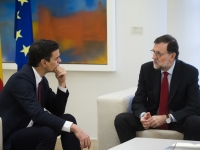Politics
The future of Rajoy is in the air
Consequence of parliamentary atomization
USPA NEWS -
The fragmentation of the Spanish Parliament, where thirteen political parties are represented in seven parliamentary groups, maintains, a month after the general elections on December 20, 2015, the unknown of the future Government and, related to that, for the immediate future of Mariano Rajoy.
The acting Prime Minister speaks in the past, as if he assumed the impossibility of getting the support they need to be re-elected. Although it has abstention from centrist Citizens have the opposite of the Socialist Party (PSOE), with only 90 deputies, refuses to negotiate with Rajoy forming a great constitutionalist bloc with the conservative Popular Party (PP), the PSOE and Citizens. The Socialists intend to form a minority Government if Rajoy fails re-election and they seek support among leftist parties.
The Socialists might have the favorable votes of 90 deputies plus 69 from the extreme left represented by the populist Podemos (We can) and other minority formations, the five members of the Basque nationalists, both the communist United Left and other parties integrated in the Joint Group of the Lower House and that this week, in his meetings with King Philip VI, to the monarch have expressed their intention to support an endowment of socialist Secretary General, Pedro Sanchez.
To achieve this goal, Sanchez needs the abstention of Catalan independence and Citizens. And it is precisely here that the acting Prime Minister, Mariano Rajoy, trust spoil the socialist attempt to gain power. Sources Moncloa Palace, the headquarters of the Prime Minister of Spain, report that Rajoy, who has chosen not go on their first attempt, would be waiting to fail for Pedro Sanchez then propose a reform program and submit to a new session of investiture.
This approach has led to the first divisions within the conservative PP. Prominent leaders of the Conservative Party criticized the inaction of Rajoy and warn of the risks expected to fail the Socialist candidate. Because sufficient independence Catalans voted for Pedro Sanchez as president of a weak Government, powerless to oppose to independence for Catalonia, so that the next Government of Spain is Socialist. And while the clock is ticking and the specter of new elections is stirred on the horizon.
Liability for this article lies with the author, who also holds the copyright. Editorial content from USPA may be quoted on other websites as long as the quote comprises no more than 5% of the entire text, is marked as such and the source is named (via hyperlink).






